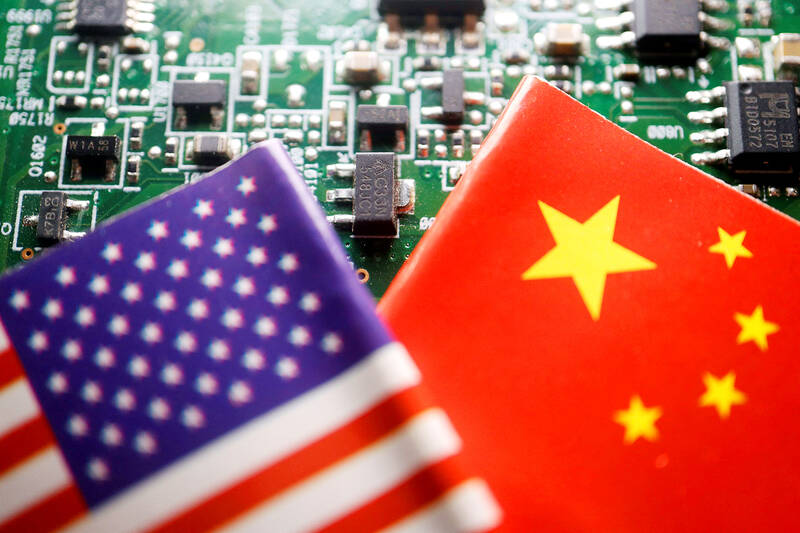Affected by US restrictions on China’s access to chipmaking machines, Taiwan’s exports to China and Hong Kong last month fell 26 percent from a year earlier to US$151 million, Ministry of Finance data showed.
While an improvement from March’s fall of nearly 34 percent, it still marked the 10th consecutive month of declines.
US-China tensions have risen over Taiwan, with the world’s leading producer of cutting-edge chips seeking greater ties with Washington in the face of rising pressure from Beijing.

Photo: Reuters
President Tsai Ing-wen (蔡英文) met with then-US House of Representatives speaker Nancy Pelosi last year and current speaker Kevin McCarthy last month, adding to strains.
US President Joe Biden has repeatedly stressed the need to place “guardrails” around the increasingly combative relationship, but China says those efforts are not genuine.
Taiwan’s slumping exports are also attributable to the ongoing dropoff in global demand for technology. The nation’s exports plunged 13.3 percent overall last month, as worldwide purchases of electronics remained weak.
Shipments to China of integrated circuit chips — pivotal components of electronic appliances, computers and smartphones — fell 19 percent from a year earlier, declining for a sixth straight month.
Separately, Taiwan Semiconductor Manufacturing Co (TSMC, 台積電), the world’s largest contract chipmaker, yesterday said sales last month stopped a two-month falling streak, with analysts citing a relatively low comparison base in March for the rebound.
In a statement, TSMC said it posted NT$147.9 billion (US$4.81 billion) in consolidated sales, up 1.7 percent from March.
Sales in March declined to a 17-month low of NT$145.41 billion, down 10.9 percent from a month earlier and 15.4 percent from a year earlier on continued inventory adjustments in the global semiconductor industry.
However, on an annual basis, sales last month declined 14.3 percent, TSMC said.
In the first four months of this year, TSMC’s consolidated sales stood at NT$656.53 billion, down 1.1 percent from a year earlier.
Additional reporting by CNA

Taiwan Semiconductor Manufacturing Co (TSMC, 台積電) last week recorded an increase in the number of shareholders to the highest in almost eight months, despite its share price falling 3.38 percent from the previous week, Taiwan Stock Exchange data released on Saturday showed. As of Friday, TSMC had 1.88 million shareholders, the most since the week of April 25 and an increase of 31,870 from the previous week, the data showed. The number of shareholders jumped despite a drop of NT$50 (US$1.59), or 3.38 percent, in TSMC’s share price from a week earlier to NT$1,430, as investors took profits from their earlier gains

In a high-security Shenzhen laboratory, Chinese scientists have built what Washington has spent years trying to prevent: a prototype of a machine capable of producing the cutting-edge semiconductor chips that power artificial intelligence (AI), smartphones and weapons central to Western military dominance, Reuters has learned. Completed early this year and undergoing testing, the prototype fills nearly an entire factory floor. It was built by a team of former engineers from Dutch semiconductor giant ASML who reverse-engineered the company’s extreme ultraviolet lithography (EUV) machines, according to two people with knowledge of the project. EUV machines sit at the heart of a technological Cold

AI TALENT: No financial details were released about the deal, in which top Groq executives, including its CEO, would join Nvidia to help advance the technology Nvidia Corp has agreed to a licensing deal with artificial intelligence (AI) start-up Groq, furthering its investments in companies connected to the AI boom and gaining the right to add a new type of technology to its products. The world’s largest publicly traded company has paid for the right to use Groq’s technology and is to integrate its chip design into future products. Some of the start-up’s executives are leaving to join Nvidia to help with that effort, the companies said. Groq would continue as an independent company with a new chief executive, it said on Wednesday in a post on its Web

CHINA RIVAL: The chips are positioned to compete with Nvidia’s Hopper and Blackwell products and would enable clusters connecting more than 100,000 chips Moore Threads Technology Co (摩爾線程) introduced a new generation of chips aimed at reducing artificial intelligence (AI) developers’ dependence on Nvidia Corp’s hardware, just weeks after pulling off one of the most successful Chinese initial public offerings (IPOs) in years. “These products will significantly enhance world-class computing speed and capabilities that all developers aspire to,” Moore Threads CEO Zhang Jianzhong (張建中), a former Nvidia executive, said on Saturday at a company event in Beijing. “We hope they can meet the needs of more developers in China so that you no longer need to wait for advanced foreign products.” Chinese chipmakers are in